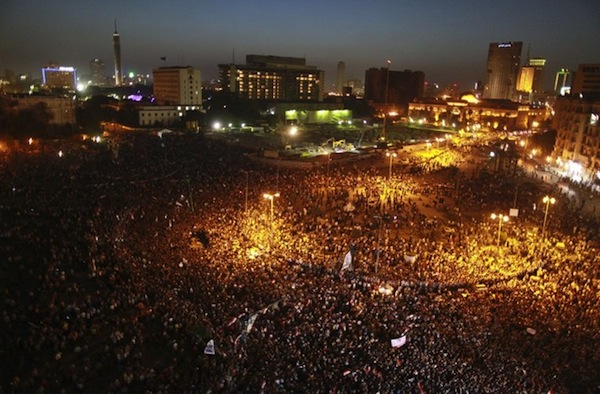
Protesters in Egypt’s Tahrir Square in 2012. Source: Google Images
The international relations history buffs among you probably know the story of former Chinese premier Zhou Enlai’s quip about the French Revolution: when someone asked him about the revolution on one of President Nixon’s trips to China in the early 1970s, he said that it was “too soon to say.” Last year, a former foreign service officer–who was at the meeting–clarified that Zhou’s remarks were mistranslated in what the foreign service officer characterized as “a misunderstanding that was too delicious to invite correction.” In fact, Zhou had been referring to the French student riots that had happened a few years earlier in 1968, not the revolution of 1789. While I was initially disappointed when this myth was shattered for me—the idea that one might not know the full effects of a revolution about two hundred years after it had occurred is intriguing—Zhou Enlai’s more prosaic point is perhaps more valuable for those of us trying to evaluate the outcomes of present-day revolutions.
The future of post-Arab Spring Egypt, Libya, and Tunisia defies easy predictive speculation. In Egypt, the military government is reluctant to make the transition to civilian rule, and tensions are running high over delayed election results. Egypt also confronts areas of deep legal and constitutional uncertainty, which Nathan J. Brown of the Carnegie Endowment documents in a lucid and detailed analysis. In Libya, regional and ethnic tensions threaten to veer the country’s fledgling transition off course. As a New York Review of Books article offering a rare look at Libya notes,* the capital, Tripoli, has made notable progress, but deep sources of conflict remain in the country’s outlying areas. Serious, basic governance issues persist: the “new Libya still has no criminal justice system, because the judges are too nervous to issue verdicts, and the police too powerless to enforce them.” Across the border, Tunisia, which has enjoyed a relatively smooth transition, appears increasingly divided along religious and political lines. Marina Ottaway, also of the Carnegie Endowment, notes that the fragmentation within Tunisia’s governing coalition “does not mean that a crisis is imminent, [but] it is a reminder of the difficulties and complications involved in even a successful transition.”
After the fall of Hosni Mubarak, Hillary Clinton and Barack Obama evidently had a conversation in which Clinton told Obama, “I think that this [Egypt situation] will be okay, but it may be okay only in 25 years.” Even tabling the question of how Secretary Clinton might define “okay” and in what context, her comment is notable because one does not often hear political leaders mention such long time horizons. I think that it is all too easy to forget that achieving stable democracy after a revolution takes some time; the condition of the U.S. in the years following its own independence provides a prime example of this idea. Also, the democracies or political systems that emerge in Egypt, Libya, and Tunsia are likely to be different from any democracies or political systems that exist now, making speculating about the future especially challenging. While many in the U.S. (your blogger included) initially viewed the uprisings as a push for liberal-style democracy, the situation is much more complex. A combination of hindsight and increased popular attention to the details of each country’s history and politics make this reality clearer by the day. To borrow Zhou Enlai’s frequently misunderstood words, it is simply “too soon to say” what the outlook is for Egypt, Libya, and Tunisia.
*h/t to the Foreign Policy Association’s “Global Views” enewsletter